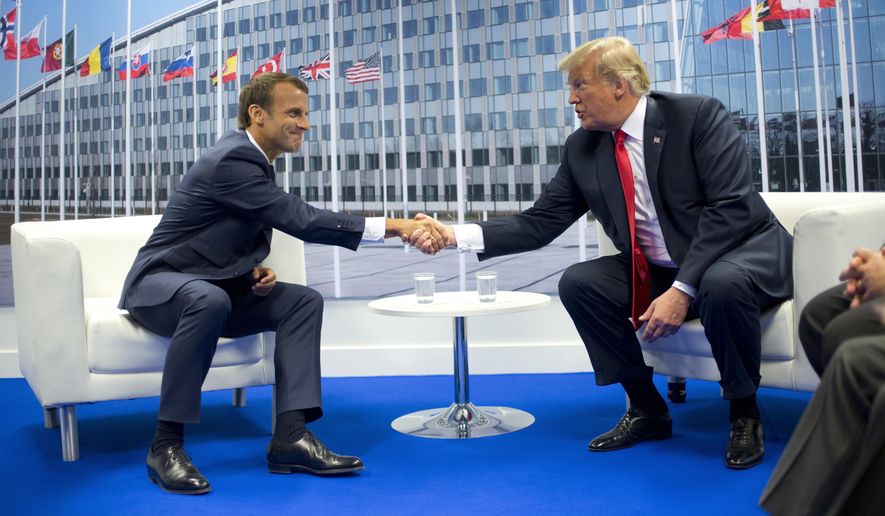French President Emmanuel Macron and President Trump on the sidelines of the NATO summit in Brussels have reportedly agreed on a plan to push Middle East allies Saudi Arabia, Egypt and Jordan to start talks on way to put an end to Syria’s seven-year civil war.
French and U.S. officials at the ministerial held at NATO headquarters did not disclose additional details of the conversation between Mr. Trump and Mr. Macron on how they planned to entice the Gulf nations, as well as diplomats from Germany and the United Kingdom to come to the negotiating table. But the preliminary agreement between the U.S. and France comes ahead of two key meetings between both leaders and Russian President Vladimir Putin.
Russian forces, along with Iranian military advisers and paramilitary groups like Hezbollah, have been vital in aiding regime forces loyal to Syrian President Bashar Assad in quashing anti-government rebels in Damascus’ brutal military campaign — including the use of chemical weapons — beginning in 2011.
Since then Russian forces backing the Assad regime and American forces battling the Islamic State in Syria since 2014, have maintained an uneasy detente with both sides attempting to keep out of each others’ paths in the country.
But with last year’s collapse of Raqqa — the Syrian capital of the terror group’s so-called caliphate — Russian and Iranian-backed Syrian forces have been aggressively taking back territory held by the group also known as ISIS, while continuing to batter remaining enclaves of the country under rebel control.
But with ISIS now driven underground in both Syria and neighboring Iraq, Mr. Trump has made public overtures that it was now time for the U.S.-led mission in Syria to come to an end. In April, Mr. Trump suggested “it’s time to come back home” from Syria. “We’ve had a tremendous military success against ISIS. I want to get out, I want to bring our troops back home. I want to start rebuilding our nation,” he said during a White House press conference that month.
The future of that U.S. mission — along with the proposed peace talks brokered by Washington and Paris — will be one of several hot-button topics Mr. Trump and Mr. Putin will discuss during a one-on-one meeting in Helsinki, set for next Wednesday. Mr. Macron is also expected to bring up the regional peace talks for Syria with the Russian leader, when the two are expected to meet on the sidelines of the World Cup, which is being held in Moscow and where France is vying for the title.
Late last month, Moscow announced plans for a massive military drawdown in Syria. Just over 1,100 Russian soldiers and over 20 jet fighters and attack helicopters have been withdrawn from frontline positions inside the country, in a move Mr. Putin claimed was the beginning of the end of the country’s involvement in the war-torn nation.
Russian military leaders say the ongoing withdrawal is not linked to the upcoming Finland summit with the U.S., but is part of a long-term effort beginning last December to ramp down Moscow’s military footprint in Syria. That month, Mr. Putin announced the drawdown plan after a one-on-one meeting with Mr. Assad during a surprise visit to Syria.
The plan continues to see a healthy amount of skepticism among Pentagon officials, noting Moscow’s spotty track record on previous plans to scale down its military presence. Moscow announced plans to draw down its forces in Syria in 2016, tied to a Russian-brokered ceasefire in March of that year. Russia again vowed to step back its military presence in Syria in December 2016, after regime forces retook the rebel stronghold of Aleppo that month.
In both instances, Moscow’s significant military presence remained in place despite Russia’s assurances.
• Carlo Muñoz can be reached at cmunoz@washingtontimes.com.




Please read our comment policy before commenting.